Sustainable Operations and Destinations: Insights for Tourism Sector
VerifiedAdded on 2023/03/31
|6
|1047
|271
Essay
AI Summary
This essay provides an overview of sustainable practices and responsible consumption within the tourism and hospitality sector, highlighting the importance of maintaining ecological, environmental, and sociological factors. It discusses the phases of sustainability, including safety, growth, abundance, progression, and inheritance, and examines personal consumption patterns within the T&H sector. The essay also addresses global challenges such as limited space, staffing issues, competition, security concerns, poor infrastructure, and taxation, and emphasizes the positive impact of sustainable tourism on government revenues, infrastructure improvement, and environmental protection. In conclusion, the essay advocates for government intervention to improve infrastructure, security, and regulate taxes to support the sustainable growth of the tourism industry.
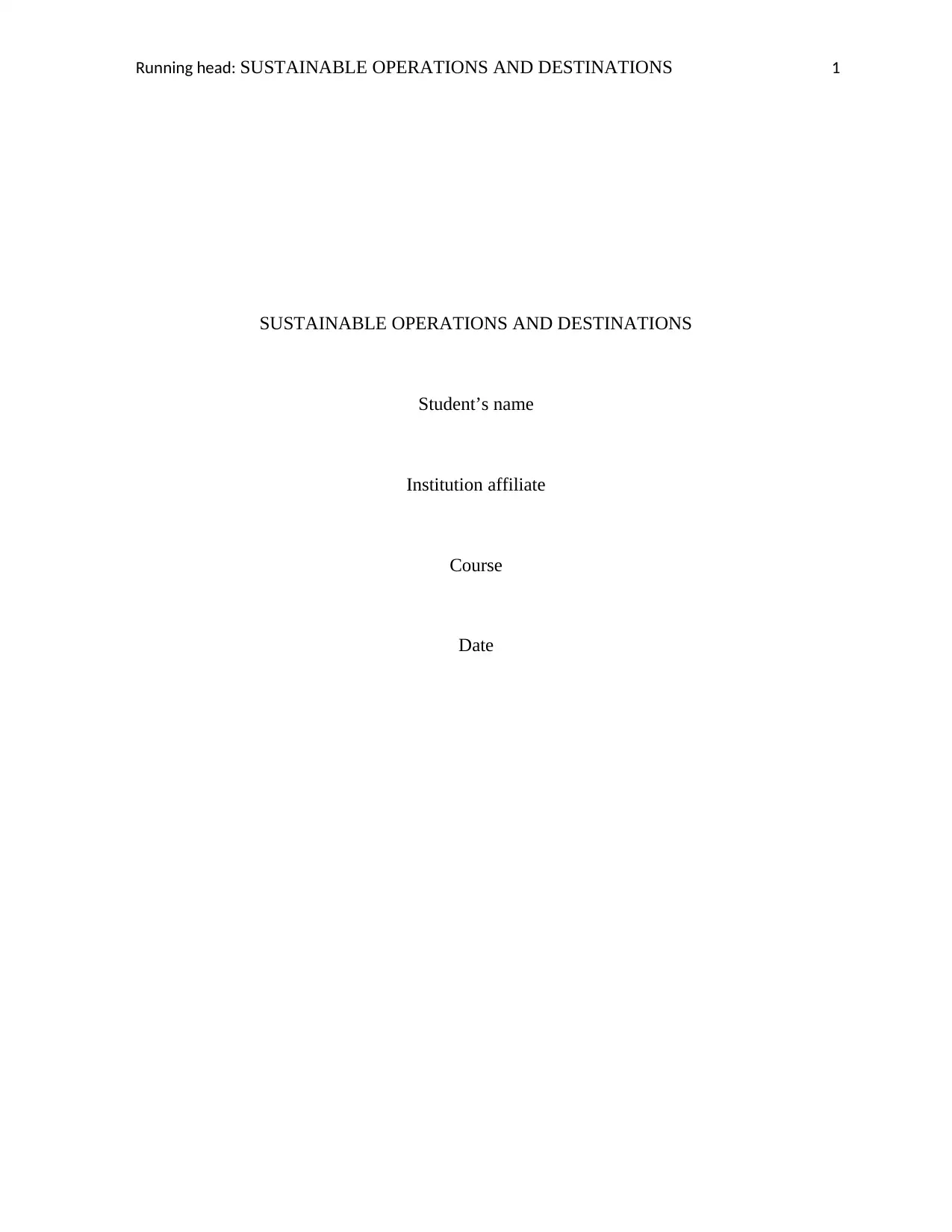
Running head: SUSTAINABLE OPERATIONS AND DESTINATIONS 1
SUSTAINABLE OPERATIONS AND DESTINATIONS
Student’s name
Institution affiliate
Course
Date
SUSTAINABLE OPERATIONS AND DESTINATIONS
Student’s name
Institution affiliate
Course
Date
Paraphrase This Document
Need a fresh take? Get an instant paraphrase of this document with our AI Paraphraser
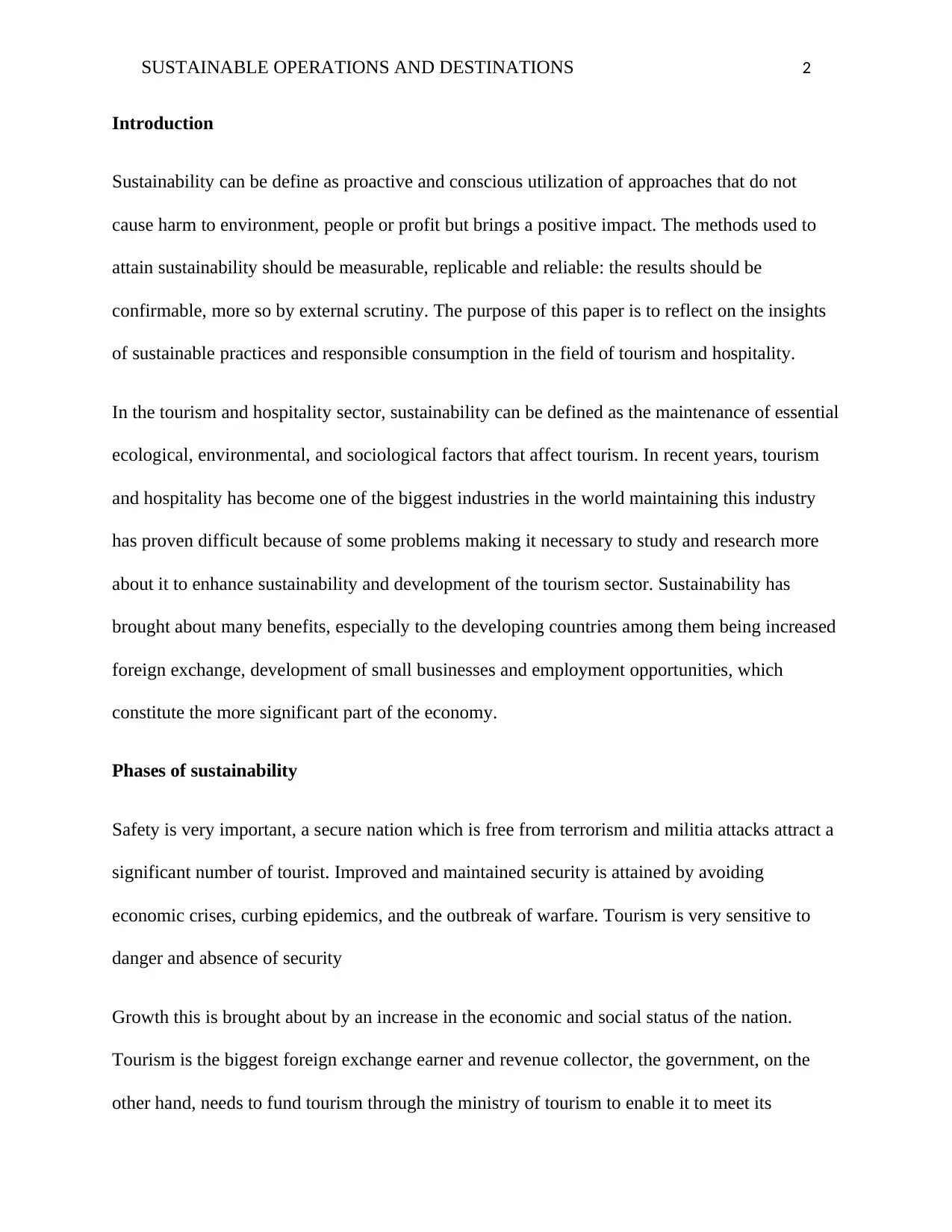
SUSTAINABLE OPERATIONS AND DESTINATIONS 2
Introduction
Sustainability can be define as proactive and conscious utilization of approaches that do not
cause harm to environment, people or profit but brings a positive impact. The methods used to
attain sustainability should be measurable, replicable and reliable: the results should be
confirmable, more so by external scrutiny. The purpose of this paper is to reflect on the insights
of sustainable practices and responsible consumption in the field of tourism and hospitality.
In the tourism and hospitality sector, sustainability can be defined as the maintenance of essential
ecological, environmental, and sociological factors that affect tourism. In recent years, tourism
and hospitality has become one of the biggest industries in the world maintaining this industry
has proven difficult because of some problems making it necessary to study and research more
about it to enhance sustainability and development of the tourism sector. Sustainability has
brought about many benefits, especially to the developing countries among them being increased
foreign exchange, development of small businesses and employment opportunities, which
constitute the more significant part of the economy.
Phases of sustainability
Safety is very important, a secure nation which is free from terrorism and militia attacks attract a
significant number of tourist. Improved and maintained security is attained by avoiding
economic crises, curbing epidemics, and the outbreak of warfare. Tourism is very sensitive to
danger and absence of security
Growth this is brought about by an increase in the economic and social status of the nation.
Tourism is the biggest foreign exchange earner and revenue collector, the government, on the
other hand, needs to fund tourism through the ministry of tourism to enable it to meet its
Introduction
Sustainability can be define as proactive and conscious utilization of approaches that do not
cause harm to environment, people or profit but brings a positive impact. The methods used to
attain sustainability should be measurable, replicable and reliable: the results should be
confirmable, more so by external scrutiny. The purpose of this paper is to reflect on the insights
of sustainable practices and responsible consumption in the field of tourism and hospitality.
In the tourism and hospitality sector, sustainability can be defined as the maintenance of essential
ecological, environmental, and sociological factors that affect tourism. In recent years, tourism
and hospitality has become one of the biggest industries in the world maintaining this industry
has proven difficult because of some problems making it necessary to study and research more
about it to enhance sustainability and development of the tourism sector. Sustainability has
brought about many benefits, especially to the developing countries among them being increased
foreign exchange, development of small businesses and employment opportunities, which
constitute the more significant part of the economy.
Phases of sustainability
Safety is very important, a secure nation which is free from terrorism and militia attacks attract a
significant number of tourist. Improved and maintained security is attained by avoiding
economic crises, curbing epidemics, and the outbreak of warfare. Tourism is very sensitive to
danger and absence of security
Growth this is brought about by an increase in the economic and social status of the nation.
Tourism is the biggest foreign exchange earner and revenue collector, the government, on the
other hand, needs to fund tourism through the ministry of tourism to enable it to meet its
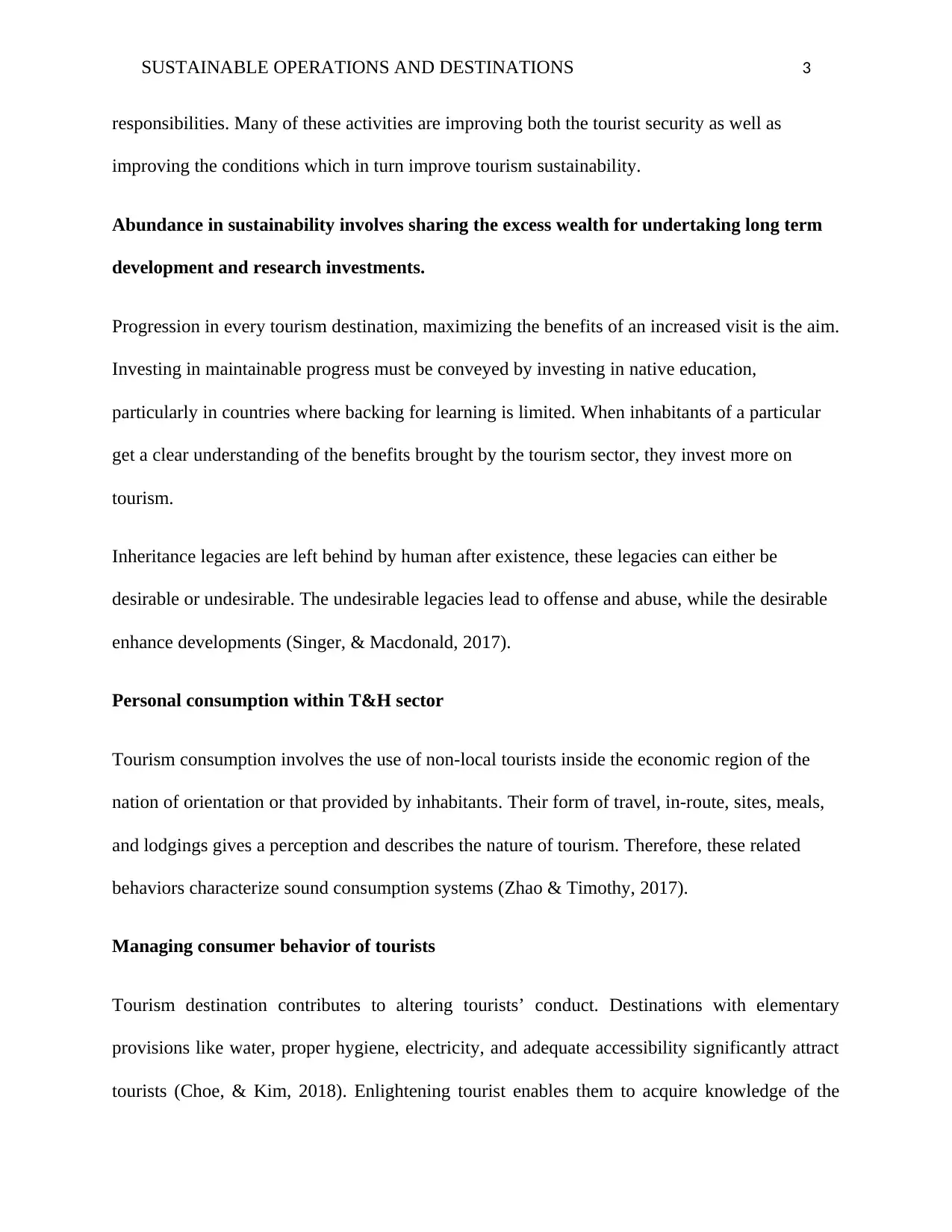
SUSTAINABLE OPERATIONS AND DESTINATIONS 3
responsibilities. Many of these activities are improving both the tourist security as well as
improving the conditions which in turn improve tourism sustainability.
Abundance in sustainability involves sharing the excess wealth for undertaking long term
development and research investments.
Progression in every tourism destination, maximizing the benefits of an increased visit is the aim.
Investing in maintainable progress must be conveyed by investing in native education,
particularly in countries where backing for learning is limited. When inhabitants of a particular
get a clear understanding of the benefits brought by the tourism sector, they invest more on
tourism.
Inheritance legacies are left behind by human after existence, these legacies can either be
desirable or undesirable. The undesirable legacies lead to offense and abuse, while the desirable
enhance developments (Singer, & Macdonald, 2017).
Personal consumption within T&H sector
Tourism consumption involves the use of non-local tourists inside the economic region of the
nation of orientation or that provided by inhabitants. Their form of travel, in-route, sites, meals,
and lodgings gives a perception and describes the nature of tourism. Therefore, these related
behaviors characterize sound consumption systems (Zhao & Timothy, 2017).
Managing consumer behavior of tourists
Tourism destination contributes to altering tourists’ conduct. Destinations with elementary
provisions like water, proper hygiene, electricity, and adequate accessibility significantly attract
tourists (Choe, & Kim, 2018). Enlightening tourist enables them to acquire knowledge of the
responsibilities. Many of these activities are improving both the tourist security as well as
improving the conditions which in turn improve tourism sustainability.
Abundance in sustainability involves sharing the excess wealth for undertaking long term
development and research investments.
Progression in every tourism destination, maximizing the benefits of an increased visit is the aim.
Investing in maintainable progress must be conveyed by investing in native education,
particularly in countries where backing for learning is limited. When inhabitants of a particular
get a clear understanding of the benefits brought by the tourism sector, they invest more on
tourism.
Inheritance legacies are left behind by human after existence, these legacies can either be
desirable or undesirable. The undesirable legacies lead to offense and abuse, while the desirable
enhance developments (Singer, & Macdonald, 2017).
Personal consumption within T&H sector
Tourism consumption involves the use of non-local tourists inside the economic region of the
nation of orientation or that provided by inhabitants. Their form of travel, in-route, sites, meals,
and lodgings gives a perception and describes the nature of tourism. Therefore, these related
behaviors characterize sound consumption systems (Zhao & Timothy, 2017).
Managing consumer behavior of tourists
Tourism destination contributes to altering tourists’ conduct. Destinations with elementary
provisions like water, proper hygiene, electricity, and adequate accessibility significantly attract
tourists (Choe, & Kim, 2018). Enlightening tourist enables them to acquire knowledge of the
⊘ This is a preview!⊘
Do you want full access?
Subscribe today to unlock all pages.

Trusted by 1+ million students worldwide
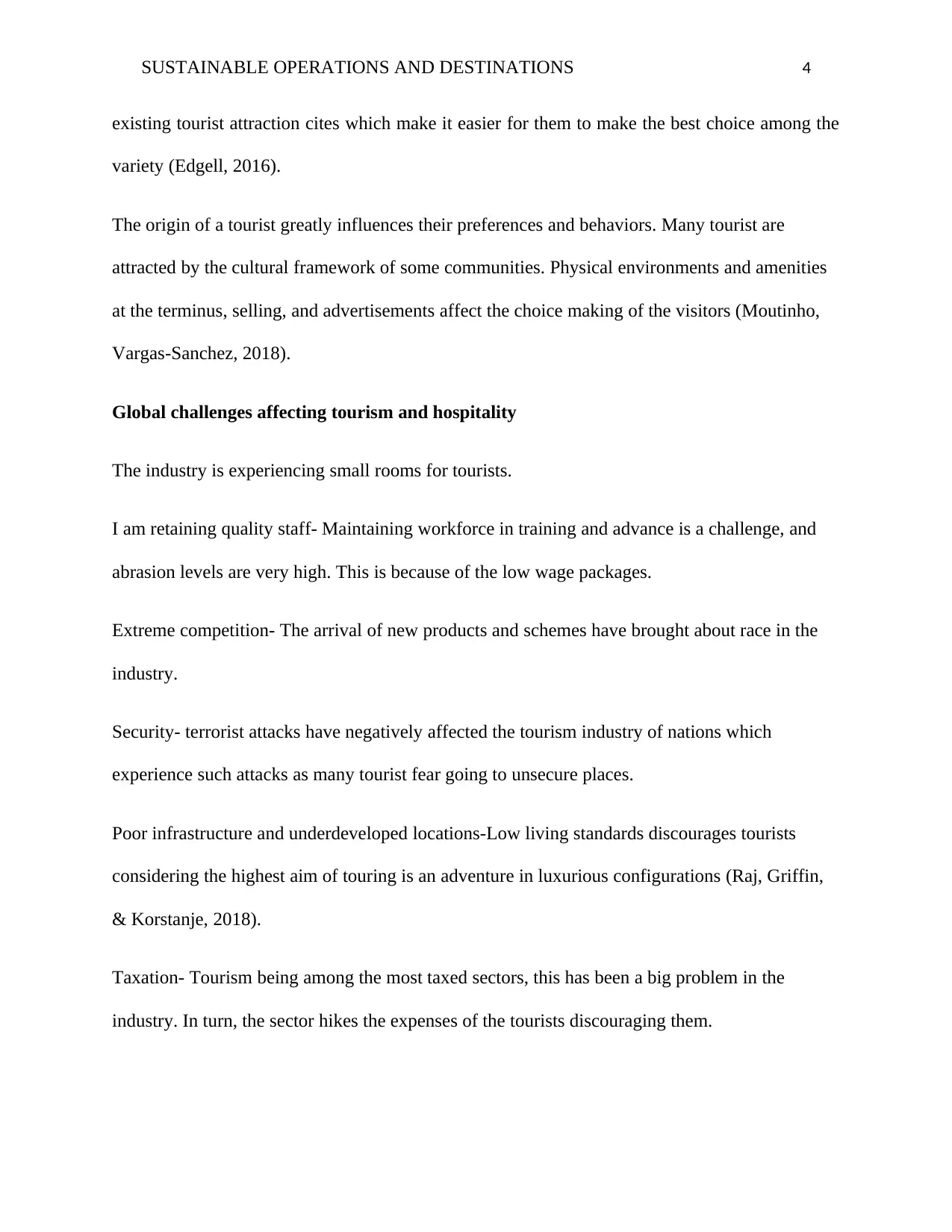
SUSTAINABLE OPERATIONS AND DESTINATIONS 4
existing tourist attraction cites which make it easier for them to make the best choice among the
variety (Edgell, 2016).
The origin of a tourist greatly influences their preferences and behaviors. Many tourist are
attracted by the cultural framework of some communities. Physical environments and amenities
at the terminus, selling, and advertisements affect the choice making of the visitors (Moutinho,
Vargas-Sanchez, 2018).
Global challenges affecting tourism and hospitality
The industry is experiencing small rooms for tourists.
I am retaining quality staff- Maintaining workforce in training and advance is a challenge, and
abrasion levels are very high. This is because of the low wage packages.
Extreme competition- The arrival of new products and schemes have brought about race in the
industry.
Security- terrorist attacks have negatively affected the tourism industry of nations which
experience such attacks as many tourist fear going to unsecure places.
Poor infrastructure and underdeveloped locations-Low living standards discourages tourists
considering the highest aim of touring is an adventure in luxurious configurations (Raj, Griffin,
& Korstanje, 2018).
Taxation- Tourism being among the most taxed sectors, this has been a big problem in the
industry. In turn, the sector hikes the expenses of the tourists discouraging them.
existing tourist attraction cites which make it easier for them to make the best choice among the
variety (Edgell, 2016).
The origin of a tourist greatly influences their preferences and behaviors. Many tourist are
attracted by the cultural framework of some communities. Physical environments and amenities
at the terminus, selling, and advertisements affect the choice making of the visitors (Moutinho,
Vargas-Sanchez, 2018).
Global challenges affecting tourism and hospitality
The industry is experiencing small rooms for tourists.
I am retaining quality staff- Maintaining workforce in training and advance is a challenge, and
abrasion levels are very high. This is because of the low wage packages.
Extreme competition- The arrival of new products and schemes have brought about race in the
industry.
Security- terrorist attacks have negatively affected the tourism industry of nations which
experience such attacks as many tourist fear going to unsecure places.
Poor infrastructure and underdeveloped locations-Low living standards discourages tourists
considering the highest aim of touring is an adventure in luxurious configurations (Raj, Griffin,
& Korstanje, 2018).
Taxation- Tourism being among the most taxed sectors, this has been a big problem in the
industry. In turn, the sector hikes the expenses of the tourists discouraging them.
Paraphrase This Document
Need a fresh take? Get an instant paraphrase of this document with our AI Paraphraser
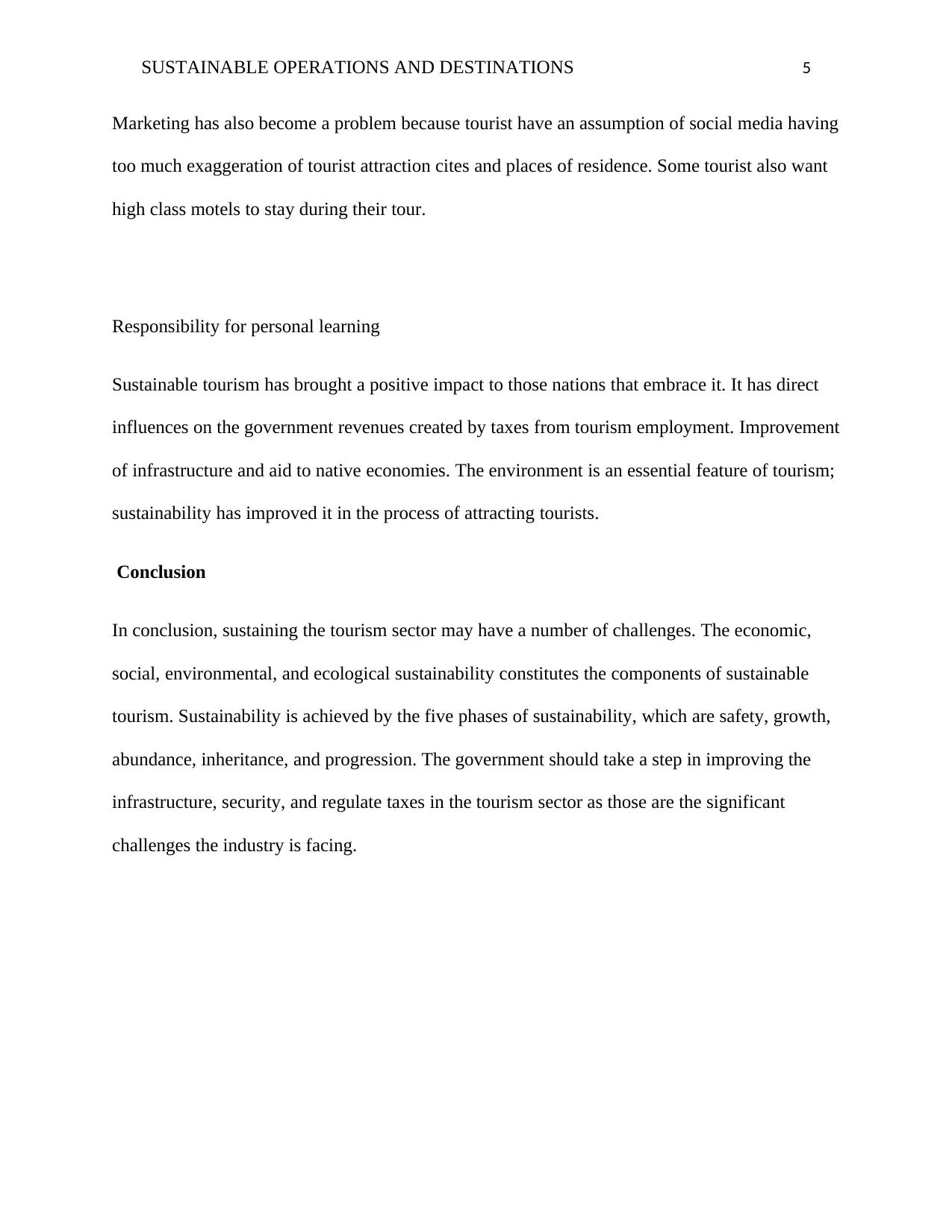
SUSTAINABLE OPERATIONS AND DESTINATIONS 5
Marketing has also become a problem because tourist have an assumption of social media having
too much exaggeration of tourist attraction cites and places of residence. Some tourist also want
high class motels to stay during their tour.
Responsibility for personal learning
Sustainable tourism has brought a positive impact to those nations that embrace it. It has direct
influences on the government revenues created by taxes from tourism employment. Improvement
of infrastructure and aid to native economies. The environment is an essential feature of tourism;
sustainability has improved it in the process of attracting tourists.
Conclusion
In conclusion, sustaining the tourism sector may have a number of challenges. The economic,
social, environmental, and ecological sustainability constitutes the components of sustainable
tourism. Sustainability is achieved by the five phases of sustainability, which are safety, growth,
abundance, inheritance, and progression. The government should take a step in improving the
infrastructure, security, and regulate taxes in the tourism sector as those are the significant
challenges the industry is facing.
Marketing has also become a problem because tourist have an assumption of social media having
too much exaggeration of tourist attraction cites and places of residence. Some tourist also want
high class motels to stay during their tour.
Responsibility for personal learning
Sustainable tourism has brought a positive impact to those nations that embrace it. It has direct
influences on the government revenues created by taxes from tourism employment. Improvement
of infrastructure and aid to native economies. The environment is an essential feature of tourism;
sustainability has improved it in the process of attracting tourists.
Conclusion
In conclusion, sustaining the tourism sector may have a number of challenges. The economic,
social, environmental, and ecological sustainability constitutes the components of sustainable
tourism. Sustainability is achieved by the five phases of sustainability, which are safety, growth,
abundance, inheritance, and progression. The government should take a step in improving the
infrastructure, security, and regulate taxes in the tourism sector as those are the significant
challenges the industry is facing.
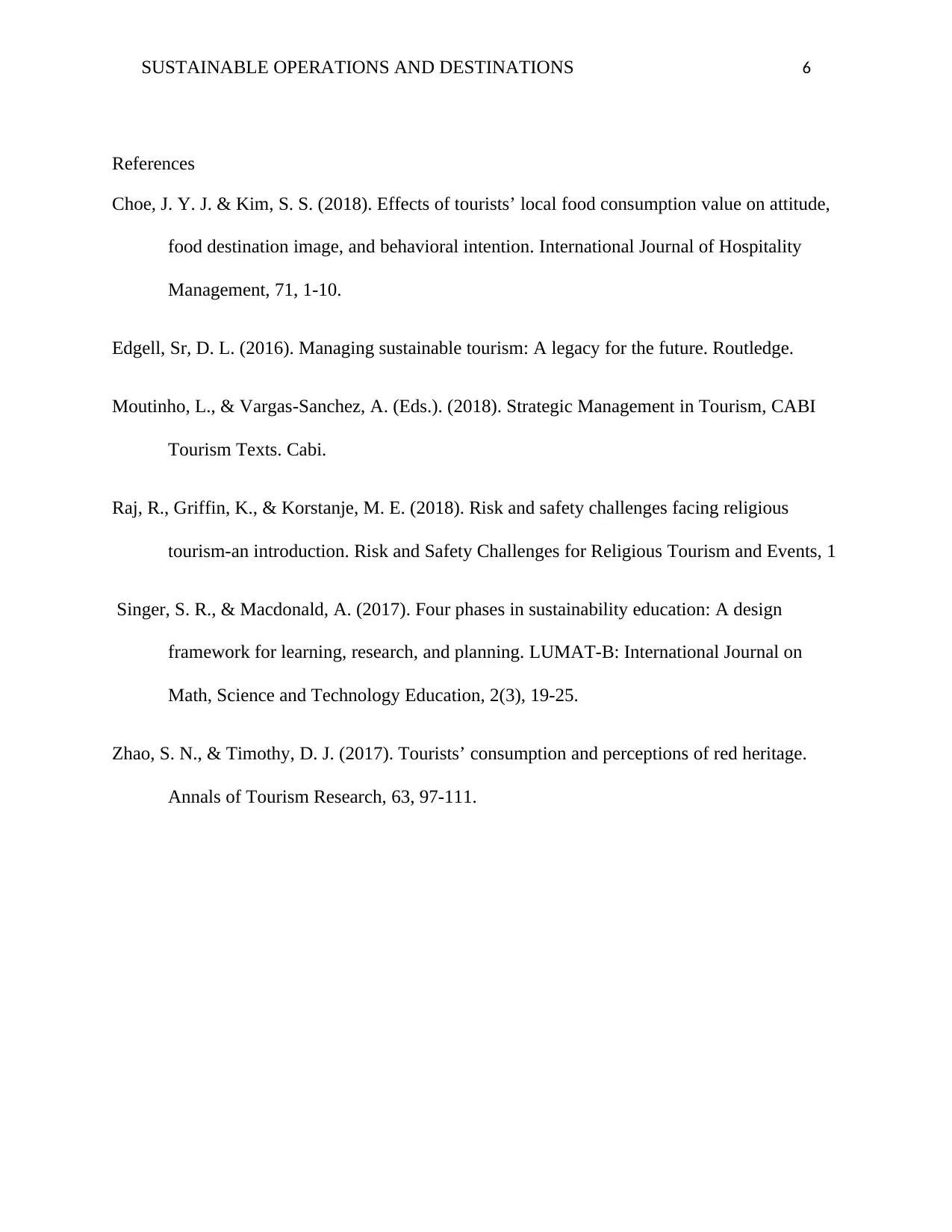
SUSTAINABLE OPERATIONS AND DESTINATIONS 6
References
Choe, J. Y. J. & Kim, S. S. (2018). Effects of tourists’ local food consumption value on attitude,
food destination image, and behavioral intention. International Journal of Hospitality
Management, 71, 1-10.
Edgell, Sr, D. L. (2016). Managing sustainable tourism: A legacy for the future. Routledge.
Moutinho, L., & Vargas-Sanchez, A. (Eds.). (2018). Strategic Management in Tourism, CABI
Tourism Texts. Cabi.
Raj, R., Griffin, K., & Korstanje, M. E. (2018). Risk and safety challenges facing religious
tourism-an introduction. Risk and Safety Challenges for Religious Tourism and Events, 1
Singer, S. R., & Macdonald, A. (2017). Four phases in sustainability education: A design
framework for learning, research, and planning. LUMAT-B: International Journal on
Math, Science and Technology Education, 2(3), 19-25.
Zhao, S. N., & Timothy, D. J. (2017). Tourists’ consumption and perceptions of red heritage.
Annals of Tourism Research, 63, 97-111.
References
Choe, J. Y. J. & Kim, S. S. (2018). Effects of tourists’ local food consumption value on attitude,
food destination image, and behavioral intention. International Journal of Hospitality
Management, 71, 1-10.
Edgell, Sr, D. L. (2016). Managing sustainable tourism: A legacy for the future. Routledge.
Moutinho, L., & Vargas-Sanchez, A. (Eds.). (2018). Strategic Management in Tourism, CABI
Tourism Texts. Cabi.
Raj, R., Griffin, K., & Korstanje, M. E. (2018). Risk and safety challenges facing religious
tourism-an introduction. Risk and Safety Challenges for Religious Tourism and Events, 1
Singer, S. R., & Macdonald, A. (2017). Four phases in sustainability education: A design
framework for learning, research, and planning. LUMAT-B: International Journal on
Math, Science and Technology Education, 2(3), 19-25.
Zhao, S. N., & Timothy, D. J. (2017). Tourists’ consumption and perceptions of red heritage.
Annals of Tourism Research, 63, 97-111.
⊘ This is a preview!⊘
Do you want full access?
Subscribe today to unlock all pages.

Trusted by 1+ million students worldwide
1 out of 6
Related Documents
Your All-in-One AI-Powered Toolkit for Academic Success.
+13062052269
info@desklib.com
Available 24*7 on WhatsApp / Email
![[object Object]](/_next/static/media/star-bottom.7253800d.svg)
Unlock your academic potential
Copyright © 2020–2026 A2Z Services. All Rights Reserved. Developed and managed by ZUCOL.


